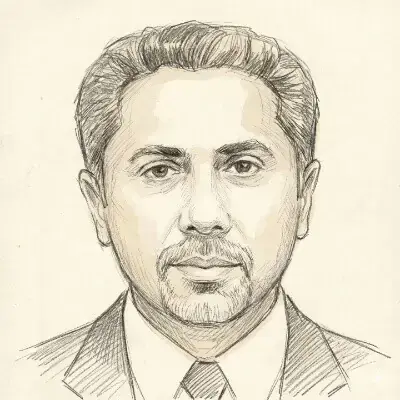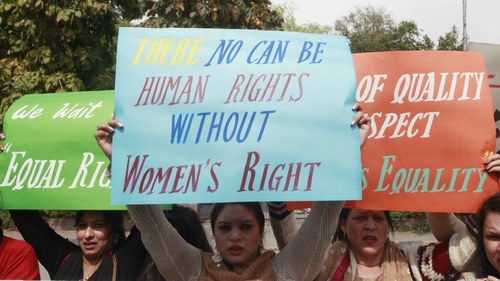Women, men and allies participated in Aurat Marches in all major Pakistani cities on Monday to mark International Women's Day and call for the protection of women's rights.
The first Aurat March was held in 2018 in Karachi. The next year, it was extended to more cities, including Lahore, Multan, Faisalabad, Larkana, and Hyderabad. This year too, the marches were held in Karachi, Lahore, Islamabad, and other cities.
Karachi
In Karachi, the march took place at Frere Hall. In view of the prevailing coronavirus situation, organisers had emphasised standard operating procedures (SOPs), including wearing masks and maintaining a distance of six feet.
Strict security arrangements were put in place at the venue, with walkthrough gates installed at the entrance, where attendants were checked before being allowed to enter. The march itself attracted a sizeable crowd, comprising people of all ages and from all walks of life.
Read | Why do women march? A look at the Aurat March 2021 manifestos
The Karachi march was also broadcast live.
Qurrat Mirza, one of the organisers of the march, took the stage and reminded the crowd why they were here.
“In 2018, we held the first march,” she said. “Four years later, we have the same demands, which is why we are going to do a symbolic sit-in.”
She added that the organisers had a 15-point manifesto for the government, which it must implement.
“If we don’t see action on our demands in the next one month, we will devise a course of action in the next three months,” she said, adding that they would do a sit-in every day if they had to.
“Because it is not acceptable to me that someone rapes my daughter and her body is found in a garbage dump.”
Lahore
In Lahore, the Aurat March started from the Lahore Press Club and reached its destination outside the Punjab Assembly building.
The Aurat March Lahore organisers also laid out a "#MeToo blanket" on which women shared their experiences of sexual violence and abuse.
TRIGGER WARNING// RAPE AND ASSAULT#AuratMarchLahore is unfolding its #metoo blanket. Women have shared their experiences of sexual violence and abuse. We're sharing small snippets from the blanket being carried by the marchers right now. (2)#PatriarchykaPandemic pic.twitter.com/1Y3SiSRW6c
— عورت مارچ لاہور - Aurat March Lahore (@AuratMarch) March 8, 2021
Participants of the march also displayed women's clothes with words written on them — termed "stains of patriarchy" — that reflected their experiences with patriarchy and the abuse suffered by them. The clothes were hung on wires across streets and walls.
"These are real stories of violence, but also an act of resistance because we no longer carry the shame associated with these acts. The same is now society's," a tweet by Aurat March Lahore said.

Islamabad
The march in Islamabad started from the National Press Club and ended at D-Chowk around 5pm. The participants of the event raised slogans about reclaiming public spaces for women.
Manifestos
Each chapter of the Aurat March has its own manifesto with the Karachi chapter focusing on patriarchal violence; Lahore on addressing healthcare workers and women’s health; and the Islamabad march is dedicated to the crisis of care.
The Karachi chapter's demands include an "end to gender-based violence by patriarchal forces as well as state-backed violence targeting activists, religious groups and communities and effective and transparent investigation of gender-based crimes and fair and expeditious trials".

Other demands include criminalisation of virginity tests for rape victims, establishment of gender-based violence reporting cells in police stations across Sindh and Pakistan, and an end to sexual harassment.
In line with its focus on healthcare workers and women's health, the Lahore chapter's demands include fulfillment of basic necessities by the state and a better infrastructure given to survivors of abuse who need access to mental as well as physical care within a rehabilitative framework in order to adequately manage the long-term effects of the violence visited upon them.
Concerns about other health issues are also raised in the document, including, educational programs and training aiming to stop stigmatization and shame associated with gendered bodies, breast cancer, reproductive health, the gender pain gap, more gender sensitized medico-legal practitioners, charging for forensic services (including from rape victims), HIV, access to free medicines, rights of PWDs, implementation of the Transgender Act 2018, access to clean water and toilets, especially to avoid contraction of Covid-19, healthcare for female prisoners, and drug addicts and users, an end to underage marriage, and several other issues associated with the health sector.
Last year, the situation at the Islamabad Aurat March turned precarious after male participants of a rival 'Haya March' by religious parties threw stones at participants of the Aurat March, injuring at least one person. The situation was brought under control by police.
Tributes
Meanwhile, tributes poured in with ministers and politicians recalling the role of women in their lives while simultaneously calling for them to be given equal rights.
Army chief Gen Qamar Javed Bajwa in his message said Pakistani women had "contributed immensely for the glory and honour of our nation". Women were also at the forefront of the fight against the Covid-19 pandemic, he noted.
Talking about women in uniform, Gen Bajwa said they have "proved their mettle by contributing copiously in diverse fields serving the nation & humanity".
"They deserve our immense respect & gratitude," he added.
National Assembly Speaker Asad Qaiser said that the protection of women's rights was the "top priority" of the government because it was "imperative for the formation of a progressive society", according to a report by Radio Pakistan.
Minister for Information Shibli Faraz said March 8 "highlighted women's high status in society and their commendable services in different sectors".
He said that the Constitution was a guarantor of women's rights and they had played an important role in the building and progress of the country.
"Making women powerful and protected in society by ensuring equal rights and equal opportunities for progress for them is our determination," he stressed.
PML-N Vice President Maryam Nawaz also talked about women empowerment, saying she "dream[s] of a Pakistan where women excel in every field and play leading roles".
Special Assistant to the Prime Minister on Health Dr Faisal Sultan paid tribute to the female health workers "who put themselves in harm's way to deliver care, on top of fulfilling their personal responsibilities and braving societal barriers that often inhibit their careers".
Federal Education Minister Shafqat Mahmood paid tribute to all the women in his life, including his mother, wife, daughters, sisters and his colleagues at work and in politics.
"Thank you for making the world a better place," he wrote.
Minister for Science and Technology Fawad Chaudhry used the occasion to encourage girls to opt for science subjects to change their and the country's destiny.
Muttahida Qaumi Movement-Pakistan (MQM-P) leader and newly-elected senator Faisal Subzwari reminded people that respecting women also meant "respecting their liberty of making choices".
He called on people to encourage the women in their families, adding "we as a society badly need educated, confident & courageous women".





































